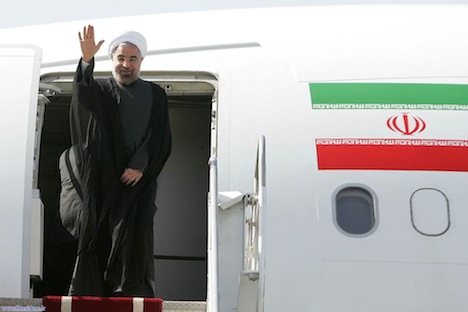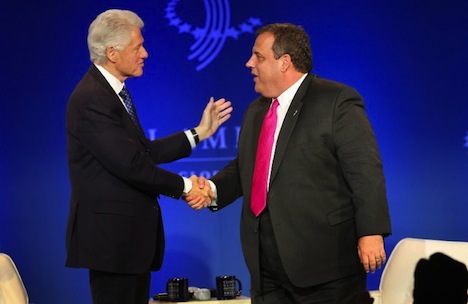Today, for the first time since 1979, the leaders of the United States and the Islamic Republic of Iran held a bilateral discussion when US president Barack Obama called Iranian president Hassan Rowhani to discuss a potential solution to the international stalemate over Iran’s nuclear energy program.![]()
![]()
It wasn’t the handshake that everyone thought might have been possible earlier this week in New York at the United Nations General Assembly, but it’s still a remarkable step — and could result in real movement between Iran and the ‘P5 + 1’ countries over the future of the Iranian nuclear program and crippling UN sanctions.
It’s important to remember that there’s a long history of misfires on US-Iranian relations, with former Iranian presidents like Hashemi Rafsanjani and Mohammed Khatami making overtures to the United States that went unrewarded — everything from Iranian assistance to Bosnian fighters in the 1990s to Iranian assistance to bring the Northern Alliance to support the US invasion of Afghanistan in 2001.
Even Rowhani, as Iran’s first nuclear negotiator in 2003, was burned when he offered a moratorium on further Iranian enrichment. That concession led to nothing but the empowerment of anti-American hardliners, who came to power with the election of Mahmoud Ahmadinejad as president in 2005.
It follows a relationship that, even before the 1979 revolution that brought Shiite ayatollahs to power in Iran, was troubled — Iranians, even today, haven’t forgotten the role that the United States played in toppling former Iranian prime minister Mohammad Mossadegh in 1953 and boosting the repressive regime of the Iranian shah through the 1979 revolution.
As I wrote shortly after Rowhani’s staggering election as president in June 2013:
The Obama administration’s challenge is to forge a strategic path with Iran’s new president that undermines the hardliners in both Iran and in the United States. Whether Iran likes it or not, it has to demonstrate to the world that it’s not pursuing clandestine nuclear weaponry. But whether the West likes it or not, it must ultimately acknowledge that Iran — a sovereign nation of 75 million people — has a right to its own nuclear energy program on terms that respect the sovereignty of the Islamic Republic, and Obama will have to back up his weekend olive branch with substantive alms that show the United States is serious.
The discussion follows a potentially even more historic meeting between US secretary of state John Kerry and Iran’s even more moderate, English-speaking foreign minister Javad Zarif (pictured below) over a potential breakthrough in the standoff over Iran’s nuclear energy program.
One telephone call between presidents and one meeting between foreign ministers doesn’t exactly mean that Iran and the United States will have solved all of their issues. Rowhani’s reluctance to meet with Obama in New York earlier this week demonstrates that, while Supreme Leader Ali Khamenei (who remains the most powerful leader in Iran) may have blessed Rowhani’s diplomatic initiatives, strong opposition remains within the Islamic Republic, including within the conservative ‘principlist’ camp and from within the Revolutionary Guards. The Obama administration will also face opposition — from its Middle Eastern ally Israel (which boycotted Rowhani’s largely conciliatory speech to the UN on Monday) and from neoconservative hawks from within the Republican Party in the United States.
But there’s a deal here: the United States doesn’t want to go to war with Iran, Iran doesn’t necessarily want nuclear weapons (and it especially wants Israel to give up its not-so-secret nuclear weapons) and Iran desperately wants an end to the sanctions that have harmed its economy.
This week’s diplomatic advances also follow the surprisingly moderate response from Iran over the Syrian chemical weapons crisis, even as the United States was considering a unilateral strike Bashar al-Assad’s regime at the time:
Although Iran has become a pariah state in recent years over its nuclear energy program (and the corresponding US and European fear that Iran is trying to develop a nuclear weapons program as well), many Iranians were the victims of the last major chemical weapons attack in the Middle East when Iraqi president Saddam Hussein deployed mustard gas and sarin against Iran during the Iraq-Iran war of the 1980s — with the knowledge and acquiescence of the United States, which wholeheartedly supported Iraq in the 1980s.
Rowhani made clear through his presidential Twitter feed this week that he condemned the use of chemical weapons, in Syria or elsewhere.
Rowhani, a former Rafsanjani aide who united both the moderate camp and Khatami’s more liberal camp (including the ‘Green movement’ supporters from the contested 2009 election), was elected in large part for the perception that he could negotiate an end to international sanctions that have crippled Iran’s economy. He handily defeated five other challengers to win a first-round victory in the June election, including two principlists — Iran’s former hardline nuclear negotiator Saeed Jalili and populist (and popular) Tehran mayor Mohammad Baqer Qalibaf:
Continue reading Obama-Rowhani call a historic first step in securing better US-Iranian relations


